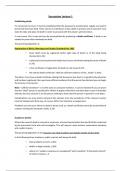Succession Lecture 1
Establishing death
For succession to occur, it must be established that the deceased is actually dead. Legally, we need to
prove that they have died. There can be no inheritance unless death is proved, and an executor must
state the date and place of death in order to proceed with the estate’s administration.
In most cases, this is easy and can be accomplished by producing a death certificate. A body is not
needed to prove that somebody has died.
The governing legislation is:
Registration of Births, Marriages and Deaths (Scotland) Act 1965
• Every death must be registered within eight days of death or of the body being
discovered (s.23);
• a physician (must examine the body) must issue a certificate stating the cause of death
(s.24);
• a free certificate of registration of death can be issued (s.27);
• the extract death certificate “shall be sufficient evidence of the...death” (s.41A).
Therefore, if you have a death certificate stating that the person has died, it is signed by the physician
and has been registered, then you have sufficient evidence that the person has died and you can begin
the process of succession.
Note: “sufficient evidence” is not the same as conclusive evidence. It can be rebutted if you can prove
that the “dead” person is actually alive. Where it appears that there may have been a case of mistaken
identity, the onus of proof is on the person seeking to show that the person in question is not dead.
Complications can arise where someone dies abroad, since the procedures of the relevant country
must be followed and they may, of course, differ from domestic arrangements.
Problems can also occur where no body is found at all, as a death certificate cannot be issued without
a doctor viewing the deceased’s body. (s.24)
Suspicious Deaths
Where the cause of death is unusual or suspicious, a formal inquiry before the sheriff will be conducted
by the procurator fiscal who will investigate. This will require a post-mortem examination (autopsy)
and a public inquiry.
The governing legislation is the Inquiries into Fatal Accidents and Sudden Deaths (S) Act 2016.
In the following three situations, public inquiries will always be held:
• fatal accidents at work, s.2(3);
• deaths in legal custody, s.2(4);
• where it is “sudden, suspicious or unexplained” and it would be “in the public interest”
to hold an inquiry, s.4
, In these situations, we hold public enquiries.
Presumption of Death
Presumption of Death (S) Act 1977
Covers areas where we don’t have a body, we don’t have a definite proof of death, but a person is
thought to have died or is not known to have been alive. Under this Act, any person having an interest
can raise an action to have a person declared legally dead.
• s.1: “Where a person who is missing is thought to have died or has not been known to be alive
for a period of at least seven years, any person having an interest may raise an action of
declarator of the death of that person.”
You can go to court and you can ask the court to look at the evidence and declare that the individual
has died. Once that is done, it allows you to distribute their estate.
• s.2: “In an action of declarator, the court, having heard proof and being satisfied on a balance
of probabilities (50.1% is enough proof) that the missing person—
a) has died, shall grant decree accordingly and shall include in the decree a finding
as to the date and time of death: provided that where it is uncertain when, within
any period of time, the missing person died, the court shall find that he died at
the end of that period;
If someone has gone missing for a period of time and you convince the court that
they are most likely on a balance of probabilities to have died, then the court will
hold that they died at the end of the period.
b) has not been known to be alive for a period of at least seven years, shall find that
the missing person died at the end of the day occurring seven years after the
date on which he was last known to be alive and shall grant decree accordingly.”
Essentially, this applies in two main situations:
• if a person is missing and there is reason to believe that person is dead, e.g. a plane
crash;
or
• if a person has been missing for seven years, e.g. a person disappearing without any
contact from anyone.
then anyone with an “interest” may ask the Session to declare the person dead.
The court will makes its decision on the balance of probability.
If there is a period of time within which the missing person could have died, the date of death will be
fixed at the end of that period. In this case, the court declares on the basis of circumstantial evidence
of death.




